.jpg)
September 2020
AAVMC Developing Minority-Serving Institution Outreach Program

Following action by the Board of Directors, the AAVMC is establishing a working group to consider strategies for improving outreach and collaboration with Minority-Serving Institutions. The AAVMC, which works closely with the Association of Public and Land grant Universities (APLU) on a number of initiatives, is already examining opportunities for more outreach to the 1890 land-grant universities.
AAVMC will begin with the 1890 land-grant universities and other HBCU’s and eventually expand its efforts to include the 1994 Native American institutions, the Hispanic-serving institutions, and urban-serving institutions.
Some of the opportunities up for consideration include student scholarships and student and faculty exchange programs.
Other measures being considered include more structured outreach to the American Board of Veterinary Specialties (ABVS) and larger veterinary medical specialty colleges within that group, including the American College of Veterinary Internal Medicine (ACVIM) and the American College of Veterinary Surgeons (ACVS).
The goal of that effort is to help ensure that more underrepresented populations of veterinarians have opportunities to pursue board certification, thereby increasing their opportunities to serve in specialty referral practices and broaden the pipeline for future faculty members in academic veterinary medicine.
These efforts are being undertaken in recognition of the AAVMC’s responsibility to help the profession evolve into one that includes more appropriate levels of diversity, equity and inclusion. They complement a broad portfolio of DEI programs and services that have earned national recognition for excellence.
New NIH Dual-Degree Clinician/Scientist Programs at Colorado State and UC Davis

Two AAVMC member institutions have been awarded prestigious National Institutes of Health (NIH) Medical Scientist Training Program (MSTP) awards to support the education of qualified DVM/PhD dual-degree students. The program supports professionals who wish to pursue research-related careers in academia, industry, and government.
The Colorado State University (CSU) College of Veterinary Medicine and Biological Sciences and the University of California-Davis (UC-D) School of Veterinary Medicine have each earned 2020 awards. They join the University of Pennsylvania School of Veterinary Medicine, which has operated a highly regarded VMD/PhD program in partnership with that university’s medical school for many years.
“This is an important moment as it shows the recognition that veterinary medicine is receiving as a leader in health overall, not just animal health,” said Dr. Michael Lairmore, dean of the University of California – Davis School of Veterinary Medicine and Past-President of the AAVMC.
This is the first time the NIH has applied MSTP funding in a DVM/PhD combined degree program with a college of veterinary medicine as the primary recipient, according to AAVMC Senior Director for Academic and Research Affairs Dr. Ted Mashima. The grants are a form of T32 program award and are provided through the NIH’s National Institute of General Medical Sciences (NIGMS).
“This award puts DVM-PhD programs on the map,” said CSU Distinguished Professor Dr. Sue Vandewoude, who directs the One Health Institute at CSU. “It will help increase the recognition that these programs are rigorous and important for the biomedical research community.”
The grants will support an array of dual degree candidate researchers who are exploring topics ranging from oncology and immunology to neuroendocrinology and musculoskeletal disorders.
The grants are a result of a decades-long request that the NIH expand the program and specifically designate a school or college of veterinary medicine as lead institution in a funded program, said Mashima. Funding veterinary medical institutions in this way will help fill a critical and well recognized gap in the training of a diverse, clinically trained research workforce with expertise in comparative medicine and animal modeling.
NIGMS Medical Scientist Training Program (MSTP) funding provides MSTP students with the opportunity to participate in an integrated program of graduate training in the biomedical sciences and clinical training offered through medical and veterinary medical schools.
The MSTP currently has 50 participating programs and supports approximately 1,000 trainees, according to NIH. MSTP participants may choose from a wide range of research training programs in the biological, chemical, physical sciences, and other areas. Trainees also engage in translational and clinical research in areas of interest to NIH and its constituent institutes and centers.
The Colorado State University College of Veterinary Medicine and Biomedical Sciences will use the grant to support the work of four clinician scientists.
At the University of California – Davis School of Veterinary Medicine, the MSTP T32 training grants will support the work of five students.
New Wellbeing Advisory Focuses on Election Season Tensions in the Workplace

The 2020 election season is in full swing, and it’s no secret that politics are a frequent source of “water-cooler” conversations in the workplace. But did you know that political tensions can have negative physical and emotional impacts? In fact, according to AAVMC Director for Wellbeing Makenzie Peterson, there is a relationship between wellbeing and election season stress. One study suggests it can lead to frayed personal relationships, compromised emotional stability, and physical problems like acute respiratory infections and gastrointestinal disorders.
Most institutions have a wide range of students, staff, and faculty who come from an even broader range of backgrounds and experiences that all influence their personal viewpoints and politics. If those opposing convictions result in community members feeling dehumanized in the workplace, it can diminish individual and organizational wellbeing.
It falls upon leadership to help their communities behave in ways that are consistent with organizational values without “dictating” perceptions and beliefs.
In this AAVMC Wellbeing Advisory titled “Wellbeing During an Election Year,” Peterson shares some fascinating data and details some strategies organizational leaders might consider for encouraging reasoned, appropriate – and healthy – political discussions on campus and how to manage election stress.
AAVMC Joins National Academy of Medicine Wellbeing Collaborative

The AAVMC has been accepted for membership in the National Academy of Medicine’s Action Collaborative on Clinician Well-Being and Resilience and joins more than 100 other organizations working to address the problem of healthcare clinician burnout. Over the past 50 years, rates of clinician burnout have drastically increased across the United States. More than 50 percent of U.S. physicians report significant symptoms.
Burnout affects clinicians of all kinds, across all specialties and care settings, according to the National Academy of Medicine. The malady is characterized by a high degree of emotional exhaustion and a low sense of personal accomplishment at work.
Clinician burnout can have serious, wide-ranging consequences, from diminished job performance and high turnover rates to the commission of medical errors and even suicide.
The collaborative is working in a variety of ways to address the problem, including program development that focuses on promoting clinician well-being, which supports improved patient-clinician relationships, a highly-functioning healthcare team, and an engaged and effective workforce.
Supporting clinician well-being requires sustained attention and action at organizational, state, and national levels, as well as investment in research and information-sharing to advance evidence-based solutions.
Network organizations must develop an organizational commitment and actively engage with the collaborative members with respect to information sharing, meetings and conferences, and other programs.
Nomination Cycle for 2021 AAVMC Awards Open Through October 15, 2020

The AAVMC annually presents a series of professional recognition awards designed to inspire and recognize excellence in teaching, research, service, diversity and inclusion and other important areas of academic veterinary medicine. The nomination period is now open for the 2020-21 series of awards, which will be presented during the 2021 annual conference in Washington.
The professional excellence awards that will be presented this year include:
- AAVMC Excellence in Research Award
- AAVMC Distinguished Veterinary Teacher Award, Presented by Zoetis
- AAVMC Senator John Melcher, DVM Leadership in Public Policy Award
- AAVMC Billy E. Hooper Award for Distinguished Service
- Iverson Bell Award
- Patricia M. Lowrie Diversity Leadership Scholarship
Eligibility for these awards is generally limited to members of the AAVMC member institution community unless otherwise noted in the individual award announcements. Nominators are encouraged to review individual award criteria and to consider the importance of diversity as an AAVMC core value in selecting potential nominees for recognition.
The nomination deadline for all awards listed above is October 15, 2020. Nomination materials must be submitted through this portal for consideration. For more information, please see our awards page here or contact AAVMC Manager for Member Engagement Ms. Lawann Blunt at lblunt@aavmc.org.
AAVMC Launches Online VMSAR Directory
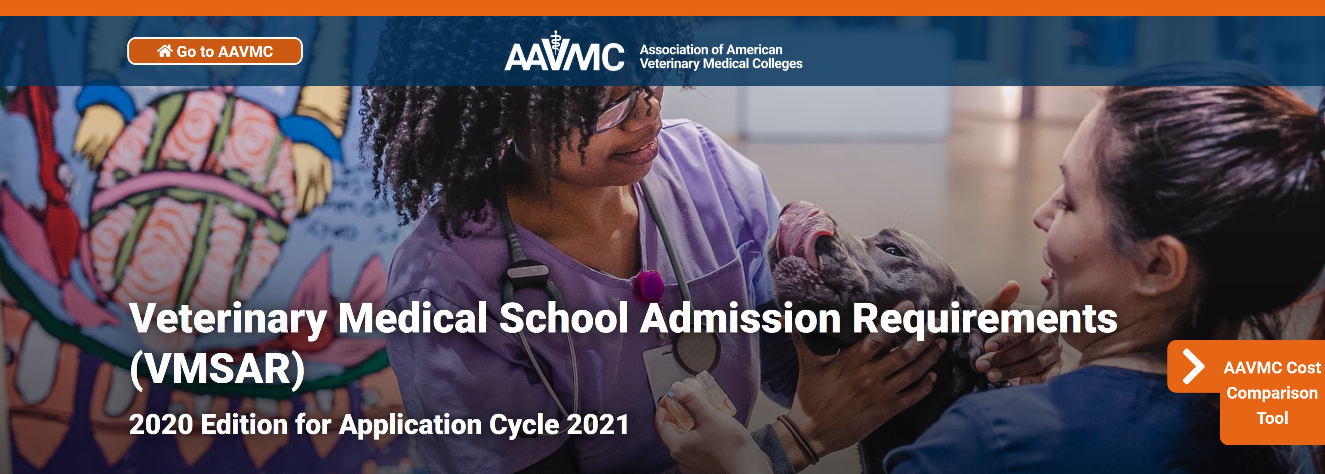
For aspiring veterinarians, the Veterinary Medical School Admissions Requirements (VMSAR) publication is the essential guide to becoming a Doctor of Veterinary Medicine (DVM)—and it’s now available as an online, Web-based directory at https://applytovetschool.org/. The new content-rich website will replace the previous print version of VMSAR.
Packed with useful insights and information, VMSAR provides a comprehensive overview of the admission process for national and international veterinary schools that are AAVMC members.
The online format is ideal for today’s tech-savvy students, who are accustomed to getting fast, easily accessible information in user-friendly formats. “The idea for an entirely Web-based VMSAR has been in the works for a number of years so we are excited to be able to launch this website,” said the AAVMC’s Director for Admissions & Recruitment Affairs Diana Dabdub.
Dabdub worked closely with member institutions and a Web team to produce the online directory, which is designed for prospective students and health professions advisors. Topics covered for each school include a school description, entrance requirements, admission process and deadlines, evaluation criteria, acceptance data and the cost of tuition and attendance.
The site makes it easy for prospective students to filter schools by several criteria, including location, accreditation, and whether the school requires a GRE, interview or bachelor’s degree. The site also contains the veterinary school prerequisite chart and general information chart, along with a link to the AAVMC Cost Comparison Tool. Additionally, the directory includes quick access to updated admissions policies as a result of COVID-19.
A few enhancements coming soon include the addition of a comparison feature and registration for complimentary site access.
AAVMC’s Leadership Academy Kicks Off New Season

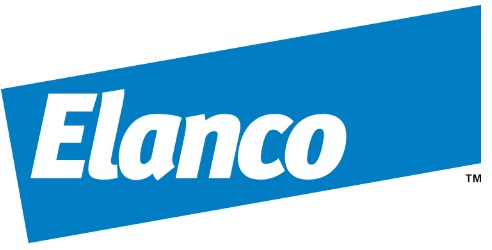 The AAVMC’s 2020-21 Leadership Academy kicks off September 11 with a new cohort of 35 participants. Those aspiring academic leaders will unite online to undertake a year-long program designed to help them develop and refine their leadership skills.
The AAVMC’s 2020-21 Leadership Academy kicks off September 11 with a new cohort of 35 participants. Those aspiring academic leaders will unite online to undertake a year-long program designed to help them develop and refine their leadership skills.Sponsored by Elanco, the leadership academy addresses how to develop effective leadership skills around the themes of communication, emotional intelligence and applied leadership skills.
The AAVMC launched the academy in 2012 to cultivate good leadership in academic veterinary medicine and provide a forum for building lasting ties between faculty members at veterinary schools and departments around the world. Each member institution typically enrolls one participant who is chosen by the dean based upon demonstrated leadership or potential.
Participants usually meet in-person three times a year with expert speakers and sessions on topics that encompass effective advocacy, fundraising, and balancing the demands of leadership. They are assigned to learning groups in which they work throughout the program, providing the opportunity to bond with and learn from teammates.
The virtual format will include monthly real-time virtual programming featuring interactive break-out sessions, a small group capstone project and virtual team-building exercises.
This year’s topics include “Leaders vs. Managers,” “Individual and Group Decision-making Strategies,” “Planning Strategically,” “The Dynamics of Team,” and “Crisis Management- the New Reality.”
The academy will finish with a presentation of the capstone projects in conjunction with the AAVMC Annual Conference in March.
Dr. Rod Bagley from Iowa State University is serving as the new director of the AAVMC’s 2020-21 Leadership Academy. Dr. Bagley is a professor and chair of the Department of Veterinary Clinical Sciences at Iowa State’s College of Veterinary Medicine, where he also directs the university’s Emerging Leaders Academy.
“Learning to adjust and adapt in crisis situations is an essential attribute of any good leader,” said Bagley. ‘Having to learn new ways to connect and achieve mutual goals is a real-world example of how to draw upon and apply leadership skills. I’m sure that we’ll also be able to learn things from this experience that will benefit us in the future, pandemic or not.”
Thanks to the generous support of Elanco, attendees were able to enroll in the academy with no registration fee.
MSD Animal Health Expands Support, Again Partners with AAVMC’s CIVME on Global Antimicrobial Resistance Education Program
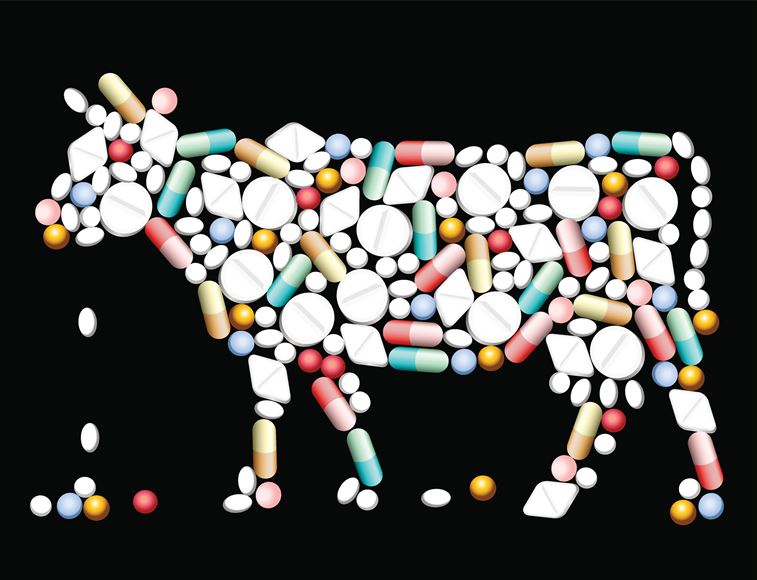
MSD Animal Health is again partnering with the AAVMC on an international grant program created to help mitigate the global public health problem of antimicrobial resistance (AMR). MSD has doubled its commitment and is funding two $10,000 grants focused on global AMR education.
Administered through the AAVMC’s Council on International Veterinary Medical Education (CIVME), the MSD Animal Health CIVME Antimicrobial Stewardship Grant program (ASGP) seeks to improve instructional programs related to AMR in educational institutions around the world. The program is currently in its second year following the successful launch in 2019.
“We’re delighted to partner with MSD Animal Health again on this promising and sustainable program focused on education, and we appreciate their increased investment in promoting its success,” said AAVMC CEO Dr. Andrew T. Maccabe. “Training students and professionals around the world about the scope of this critical problem, the consequences of inaction, and responsible therapeutic practices is an important step forward in mitigating this problem.”
The grant program goal is focused on building networks and using communication technology to increase awareness, share ideas, and support innovative approaches to improving veterinary medical education at universities around the world.
“Our company recognizes the critical importance of sound antibiotic stewardship and supports the responsible use of antibiotics to improve and maintain the health of animals,” said Elzo M. Kannekens, DVM, Director of Global Public Policy and Multilateral Affairs, MSD Animal Health. “Antibiotics are life-saving veterinary products that treat bacterial infections in both companion and food-producing animals. Their use in veterinary medicine also benefits humans by reducing the spread of disease between animals and humans and by helping facilitate a safe, efficient and sustainable food supply. We believe in taking a ‘one health’ holistic approach to the well-being of humans and animals, which includes using vaccines for the prevention of diseases. We are proud to partner with CIVME to bring forward this international grant program focused on mitigating the global public health problem of antimicrobial resistance.”
The grant program focuses on antibiotic stewardship and emphasizes disease prevention through improved vaccination protocols. Keeping more animals free from infectious disease through immunizations will reduce the amount of antimicrobial agents required to treat sick animals.
The grant program encourages multi-university collaborations on a global scale. Total project budgets should not exceed $10,000 and will be awarded for a maximum period of 24 months. Projects are expected to align with one or more criteria that advance CIVME’s mission and convincingly promote international collaboration in veterinary medical education. Indirect costs are not considered.
The online application program will be available later this month, and the grant application deadline is January 29, 2021. For details more information about the program, please contact Director for Professional Development Dr. Caroline Cantner at ccantner@aavmc.org.
PCVE to Present Virtual Meeting October 2, 2020

The Primary Care Veterinary Educators (PCVE) will hold a virtual meeting on October 2, 2020 from 3-5 p.m. (Eastern Time).
The meeting will feature a keynote address by Dr. India Lane, a professor in the University of Tennessee College of Veterinary Medicine’s Small Animal Clinical Sciences Department. The meeting will also feature break-out rooms similar to the popular “Swap Shop” event held at in-person meetings and feature other useful information for the PCVE Community.
For log-in instructions for the virtual meeting, please click here.
The AAVMC’s PCVE works to advance and inspire primary care veterinary education.
WSU to Host Regional Iverson Bell Symposium October 23-25, 2020
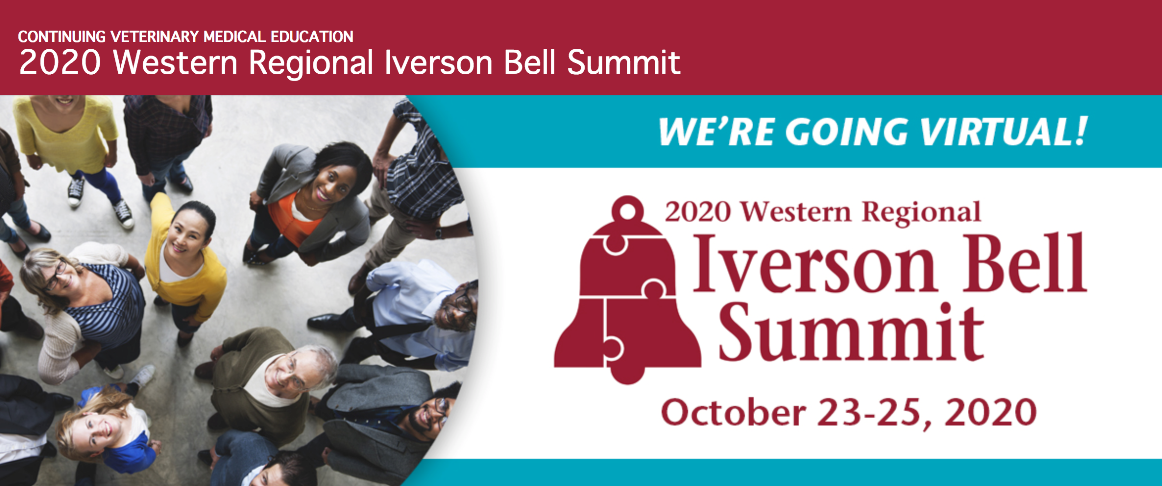
The 2020 Virtual Western Regional Iverson Bell Summit will be hosted by the Washington State University College of Veterinary Medicine from October 23-25, 2020 in Pullman, Washington.
The theme of the 2020 Summit is “Triple A (Access, Ability and Allyship): Your Map to Wellness, Diversity, and Inclusion.” The conference will explore intersectionality in veterinary academia and practice over two and a half days of virtual programming which will include afternoon breakout for discussions and interaction. For more information, contact WSU-CVM Veterinary Medicine Extension and Continuing Veterinary Medical Education Coordinator Katy Heaton at cowgirlup4ever@wsu.edu
Summit objectives include:
- Recognizing implicit biases in the classroom and curriculum, and understanding how diversity and inclusion relate to COE requirements
- Exploring and understanding differing abilities, both seen and unseen, and how veterinary institutions and organizations adapt to meet differing needs
- Identifying initiatives and gaining ideas for new programs, including their implementation, that promote a diverse culture and healthy relationships among students, faculty, staff, and professionals
The Iverson Bell Summit seeks to promote diversity, equity and inclusion in veterinary medicine and is named for the first African American veterinarian to hold the position of Vice President in the American Veterinary Medical Association.
Regional Iverson Bell Summits are held periodically around the United States. The AAVMC formerly hosted a national Iverson Bell Symposium every other year in conjunction with its annual conference. Two years ago, the Iverson Bell Symposium became an annual component of the international conference.
In The News
Can Dogs Detect the Novel Coronavirus? The Nose Knows.Washington Post
Veterinary College Partners with Humane Genomics Inc. on COVID-19 Vaccine Development
WLTZ News
COVID-19’s Impact on the Animal Kingdom—So Far
National Geographic
A Rare Economic Bright Spot in the U.S. Health System: The Vet’s Office
The New York Times
The Coronavirus Is New, but Your Immune System Might Still Recognize It
The New York Times
Study: Delayed Neutering Benefits Larger Dogs
Today’s Veterinary Business
DVMs Essential to Future of Biomedical Research
Veterinary Practice News
Progress Toward a Treatment for Krabbe Disease
Medical Xpress
Scientists Find How to Detect Pancreatic Cancer at Treatable Stages
Knowridge Science Report
Placenta Can Indicate How Body Responds to Opioids During Pregnancy
Brinkwire
AVMA Launches Inaugural Report Describing Antimicrobial Resistance in Animals
JAVMA News
Meet the UC Davis Team Rescuing Animals From Wildfires
NBC Los Angeles/Union Journal
Eight Years In, Tufts at Tech Community Clinic Seen as Model
VIN News
Therapeutic Derived from Turmeric Shows Promise in Treating Canine Ocular Condition
Medical News
Researchers Analyze Safety of Industrial Hemp as Cattle Feed
Phys.org
Which Pups Will Make the Grade as a Service Dog?
Washington Post
Suicide Among Veterinarians is a Problem; Ohio State is Doing Something About It
WBNS News
Penn State to Study SARS-CoV-2 Potential to Infect Livestock
Feedstuffs
Growing the Veterinary Learning Credential Network with Blockchain
IBM (blog)
From Our Members
$3.86 Million NIH Grant Accelerates Purdue Veterinary Scholar’s Novel Approach in Race to Develop Effective Vaccine to Combat COVID-19Purdue
LMU Veterinary Students Recognized by OIE for Research on Animal Welfare During COVID-19
Lincoln Memorial
UC Davis Aids Long-Serving K-9 Officer
UC Davis
ER and Critical Care Function with High Level Despite Massive Caseload Growth
UC Davis
New Microscopes Help Students Learn Safely
Tufts
New Beehives Added for Veterinary Training
University of Georgia
Amazon and Congo Basin Focus of New Emerging Infectious Disease Research Center
UC Davis
People in Motion
Dr. Stacy Anderson is now Dean at the Lincoln Memorial University College of Veterinary Medicine. Dr. Jason Johnson left LMU to become Vice President with IDEXX.
Dr. Klaus Osterrieder is the new Dean at City University of Hong Kong, replacing Interim Dean Michael Yang.
Dr. Peggy Schmidt is now Associate Dean for Professional Programs at the University of Wisconsin School of Veterinary Medicine.
Dr. Srinand Sreevatsan replaced Dr. Vilma Yuzbasiyan-Gurkan as Associate Dean of Research and Graduate Studies at Michigan State University College of Veterinary Medicine.
“Like” us on Facebook or follow us on Twitter:




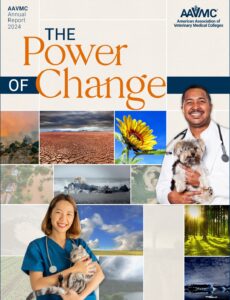
SHARE